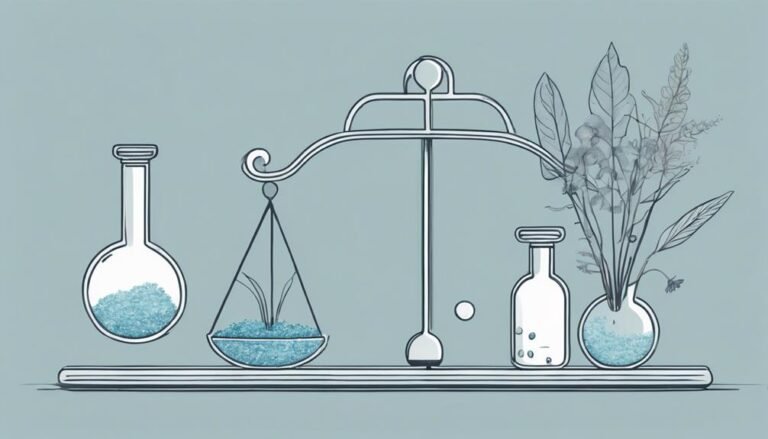7 Stress-Busting Tips for Hormonal Health After 40
To boost your hormonal health and tackle stress after 40, try these seven tips. Prioritize quality sleep by establishing a regular bedtime routine and avoiding screens before bed. Incorporate regular exercise, aiming for at least 150 minutes a week to release those feel-good endorphins. Practice mindfulness techniques like deep breathing and journaling to stay centered. Maintain a balanced diet filled with whole foods, and don't forget to stay hydrated. Foster strong relationships for emotional support, and manage your time effectively to reduce overwhelm. Stick around, and you'll discover more insights on enhancing your well-being.
Key Takeaways
- Prioritize quality sleep by establishing a routine and avoiding screens before bedtime to improve hormonal balance.
- Incorporate 150 minutes of moderate exercise weekly to boost mood and regulate hormones effectively.
- Practice mindfulness techniques like deep breathing and guided imagery to reduce stress and enhance hormonal health.
- Maintain a balanced diet rich in whole foods and fiber to stabilize blood sugar levels and support overall well-being.
Prioritize Quality Sleep
Prioritizing quality sleep is essential for maintaining hormonal balance and overall health after 40. When you don't get enough rest, your body struggles to regulate hormones like cortisol and melatonin, leading to increased stress and disrupted sleep patterns.
To improve your sleep quality, establish a regular bedtime routine. Create a calming environment by dimming the lights and reducing noise. Avoid screens at least an hour before bed, as blue light can interfere with melatonin production. Additionally, limit caffeine and heavy meals in the evening.
If you're still having trouble sleeping, consider relaxation techniques like deep breathing or meditation. By focusing on quality sleep, you'll enhance your hormonal health and feel more energized and balanced each day.
Incorporate Regular Exercise

Incorporating regular exercise into your routine can substantially boost your hormonal health and help manage stress levels after 40. Aim for at least 150 minutes of moderate aerobic activity each week, like brisk walking or cycling, combined with strength training twice a week.
Exercise releases endorphins, which elevate your mood and reduce anxiety. It also helps regulate hormones, improving insulin sensitivity and reducing the risk of weight gain.
Find activities you enjoy to make it easier to stick with your routine. Whether it's dancing, hiking, or yoga, the key is consistency.
Practice Mindfulness Techniques
Practicing mindfulness techniques can greatly enhance your hormonal balance and reduce stress after 40. By focusing on the present moment, you can calm your mind and improve your overall well-being. Here are some effective mindfulness techniques you can easily integrate into your daily routine:
| Technique | Description |
|---|---|
| Deep Breathing | Inhale slowly for 4 counts, exhale for 6. Repeat. |
| Body Scan | Mentally check in with each body part, releasing tension. |
| Guided Imagery | Visualize a peaceful scene to promote relaxation. |
| Journaling | Write down your thoughts and feelings to clear your mind. |
| Mindful Walking | Pay attention to each step, noticing sensations and surroundings. |
Incorporating these practices into your life can lead to profound changes in how you manage stress and hormonal fluctuations.
Maintain a Balanced Diet

A mindful approach to eating can greatly support hormonal health and help you maintain a balanced diet after 40. Focus on whole foods like fruits, vegetables, lean proteins, and healthy fats. These nutrient-rich options provide essential vitamins and minerals that regulate hormones.
Avoid processed foods high in sugar and unhealthy fats, as they can disrupt hormonal balance and lead to weight gain.
Listen to your body's hunger cues, and don't skip meals. Instead, aim for smaller, frequent meals throughout the day to stabilize blood sugar levels.
Incorporate fiber-rich foods to aid digestion and promote a healthy gut.
Stay Hydrated
Staying hydrated plays an essential role in maintaining hormonal balance and overall health after 40. When you drink enough water, you support your body's ability to regulate hormones effectively. Dehydration can lead to fatigue, mood swings, and decreased cognitive function, all of which can disrupt your hormonal health.
Aim to drink at least eight 8-ounce glasses of water daily, adjusting for activity levels and climate. If plain water doesn't excite you, infuse it with fruits or herbs for a revitalizing twist.
Also, incorporate hydrating foods like cucumbers, watermelon, and oranges into your diet. Listen to your body; if you're feeling thirsty, don't wait. Staying on top of your hydration can make a significant difference in how you feel every day.
Foster Strong Relationships

Fostering strong relationships can greatly enhance your hormonal health and overall well-being after 40. Surrounding yourself with supportive friends and family provides emotional stability, reducing stress levels.
These connections give you a sense of belonging, which can positively impact your mood and hormones. Engage in regular communication, whether it's through phone calls, texts, or face-to-face meetups.
Sharing your thoughts and feelings with trusted individuals helps relieve anxiety and fosters a sense of connection. Consider joining groups or clubs that align with your interests to expand your social circle.
Manage Time Effectively

Effective time management can greatly reduce stress and improve your hormonal health after 40.
Start by prioritizing your tasks; use a planner or digital tool to outline what needs your attention first.
Break larger projects into smaller, manageable steps to avoid feeling overwhelmed.
Set specific time blocks for work, relaxation, and self-care, ensuring you allocate time for activities that rejuvenate you.
Don't hesitate to say no to commitments that drain your energy or don't align with your priorities.
Regularly review your schedule to make adjustments and stay flexible; life can be unpredictable.
Questions
How Do Hormones Affect Stress Levels After 40?
Hormones play a vital role in regulating your body's stress response. As you age, hormonal changes can lead to increased stress levels, affecting your mood, energy, and overall well-being. It is important to manage these changes effectively.
Can Supplements Help Balance Hormones and Reduce Stress?
Supplements can support hormone balance and potentially reduce stress. You might find that certain vitamins and minerals help improve your mood and energy levels, making it easier to manage daily stressors effectively.
What Role Does Caffeine Play in Hormonal Health?
Caffeine can influence your hormonal balance by increasing cortisol levels, which may lead to heightened stress. It is crucial to monitor your intake, as too much caffeine can disrupt sleep and exacerbate hormonal issues.
How Does Stress Impact Menopause Symptoms?
When life gives you lemons, stress can squeeze menopause symptoms harder. It amplifies hot flashes, mood swings, and sleep disturbances. You'll find managing stress essential for easing those discomforts and improving overall well-being during this change.
Are There Specific Yoga Poses for Hormonal Balance?
Yes, certain yoga poses like Child's Pose, Bridge Pose, and Cat-Cow can help promote hormonal balance. These poses enhance circulation and reduce tension, supporting your body's natural hormonal regulation and overall well-being.
Conclusion
Taking charge of your hormonal health after 40 is crucial, and these stress-busting tips can make a real difference.
Imagine Sarah, a 45-year-old working mom who felt overwhelmed and exhausted. By prioritizing sleep and incorporating mindfulness practices, she found clarity and energy she thought was lost forever.
You, too, can reclaim your vigor and joy by making small, intentional changes. Embrace these strategies, and watch as your well-being transforms, leading to a happier, healthier you.







